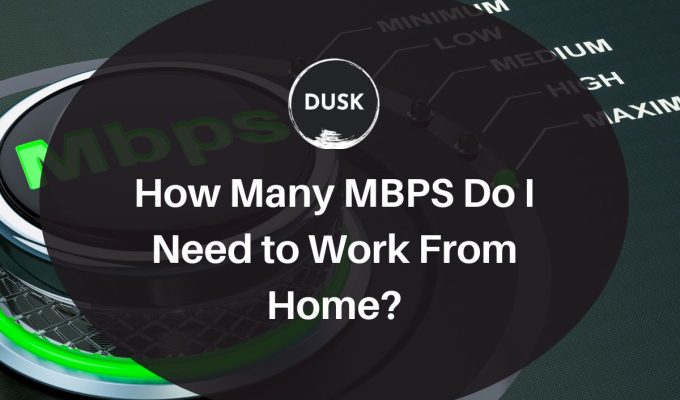You may be wondering how many MBPS do I need to work from home?A good rule of thumb is 30 Mbps is a good place to start if you want a plan to cover regular internet use and work from home.
Working from home has fast become a necessity in today’s world, and having the proper internet connection can make or break the experience. However, it’s a little daunting when most of us consider how much bandwidth we need to work from home. So, the following article will give you all the information you need to ensure your internet connection can keep up with your job requirements.
Understanding Mbps and internet connection speeds
Understanding the basics of internet speeds is critical, so you don’t end up paying for a service that doesn’t give you enough bang for your buck. Mbps is a standard unit of measurement that stands for megabits per second.
The more Mbps you have, the faster your connection will be. This is useful for streaming media, playing video games, and downloading large files, all of which might need better connections.
Knowing how much speed you need can help you sign up for the right internet service, ensuring you obtain decent download and upload speeds without paying too much.
Consider how internet speeds impact mobile devices
Internet speeds can significantly impact mobile devices, affecting everything from browsing speeds to app performance and video streaming quality. With the increasing use of mobile devices for a wide range of activities, including work, entertainment, and communication, having fast and reliable internet speeds is crucial.
Regarding general mobile phones, slow internet speeds can result in frustratingly slow loading times for websites and apps and delays in sending and receiving messages or emails. This can lead to decreased productivity and a negative user experience. Slow speeds can also result in poor call quality and dropped calls.
As for eSIMs, internet speeds are critical as they rely on a stable and reliable internet connection to activate and connect to the network. Slow or unstable internet speeds can lead to connectivity issues, slow data transfer speeds, and dropped calls. A solid mobile internet connection is crucial to ensure eSIMs function optimally.

Internet usage for working from home
While having a fast internet connection is necessary for streaming video conferences or downloading and uploading huge files, you can sometimes require super-fast speeds. For example, slower connections should suffice if your primary activities are email and online browsing.
On the other hand, if you often download high-resolution photographs and videos or use data-heavy software packages like CAD, you’ll need a more stable connection with more bandwidth.
Consider how many other people will use your internet connection. For example, if you’re working remotely with others in the same house, investing in a faster connection may be worthwhile to keep everyone active online.
Recommendations for basic browsing
The necessary Mbps for simple online browsing and emailing depends on how you intend to use the internet. For example, if you only want to check your emails and surf your favorite websites, a lesser speed of 2-5 Mbps will be fine.
On the other hand, speeds ranging from 5-50 Mbps would be ideal if you require significant data downloads. Also, remember that larger homes may require faster upload/download rates.
Mbps required for video streaming
You must have a good internet connection if you want to have a seamless and comfortable experience when streaming video or gaming (once work is done). Determining how many megabits per second your connection requires for gaming and streaming is based on the number of devices sharing the same network, your location relative to the service provider’s server, and the type of content being streamed.
In general, if you’re streaming in HD resolution, you should seek a connection with at least 10 Mbps download speed and up to 25 Mbps if you’re streaming in 4K. The optimum connection for gamers should be at least 5-10 Mbps download and 0.5-1 Mbps upload, with higher connections providing better performance.
What’s considered the best internet speed?
The FCC classifies anything above 25 Mbps as broadband internet, but many ISPs offer speeds up to 1,000 Mbps or more. 30 Mbps is a good place to start if you want a plan to cover regular internet use.
Still, if you work from home, stream videos and movies regularly, play online games, or have more than four people using the same connection, you may need more bandwidth, depending on your needs.
How to make the most of your home internet speed
If you don’t want to pay more for Mbps, there are a few other things you can get the most out of your connection. To begin, think about upgrading your router. An older model (even if purchased within the last few years) might not support today’s technologies or newer versions designed for improved performance.
Switch off any unnecessary devices running in the background, such as printers or game consoles, and double-check for patch updates for hardware or software you may have just installed. When performing speed tests, try unplugging other devices from the connection to confirm that no other usage consumes bandwidth. Finally, restart the modem every few days to keep everything functioning.
In summary
Internet speeds can significantly impact our everyday lives, professionally and personally, and having the right Mbps is essential to a successful workday. 30 Mbps is a good place to start if you want a plan to cover regular internet use.
Your video calls may lag without adequate bandwidth, or your files may take forever to upload and download. Or worse, you may be disconnected at a crucial moment. With the tips above, you can maximize your productivity and efficiency by ensuring you have the right speed.






